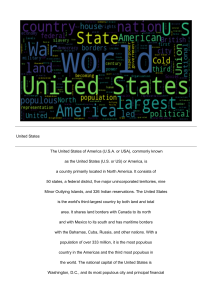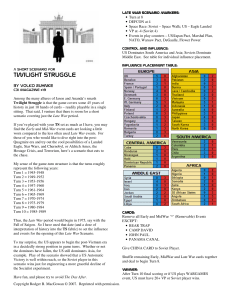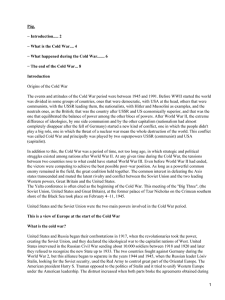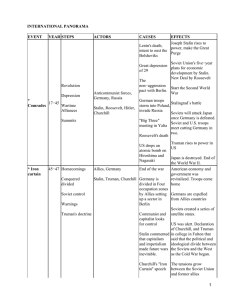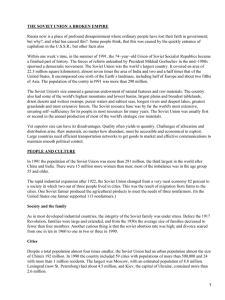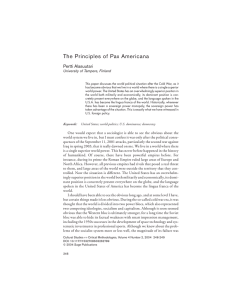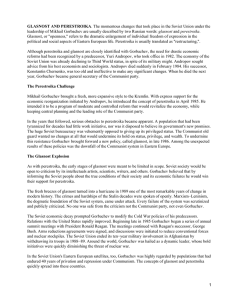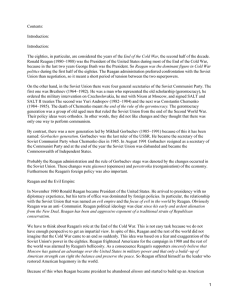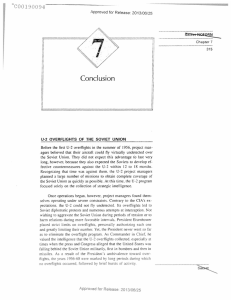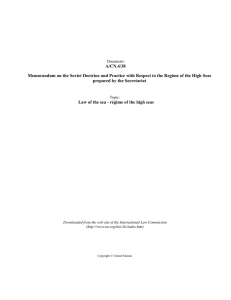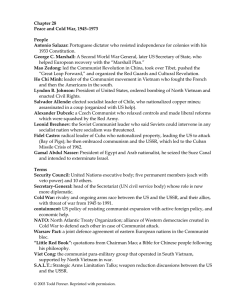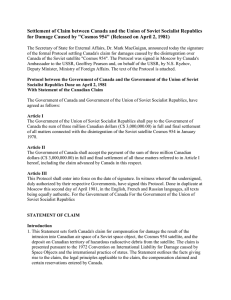Review : Lenin and Western Socialism by Roy Medvedev
Anuncio
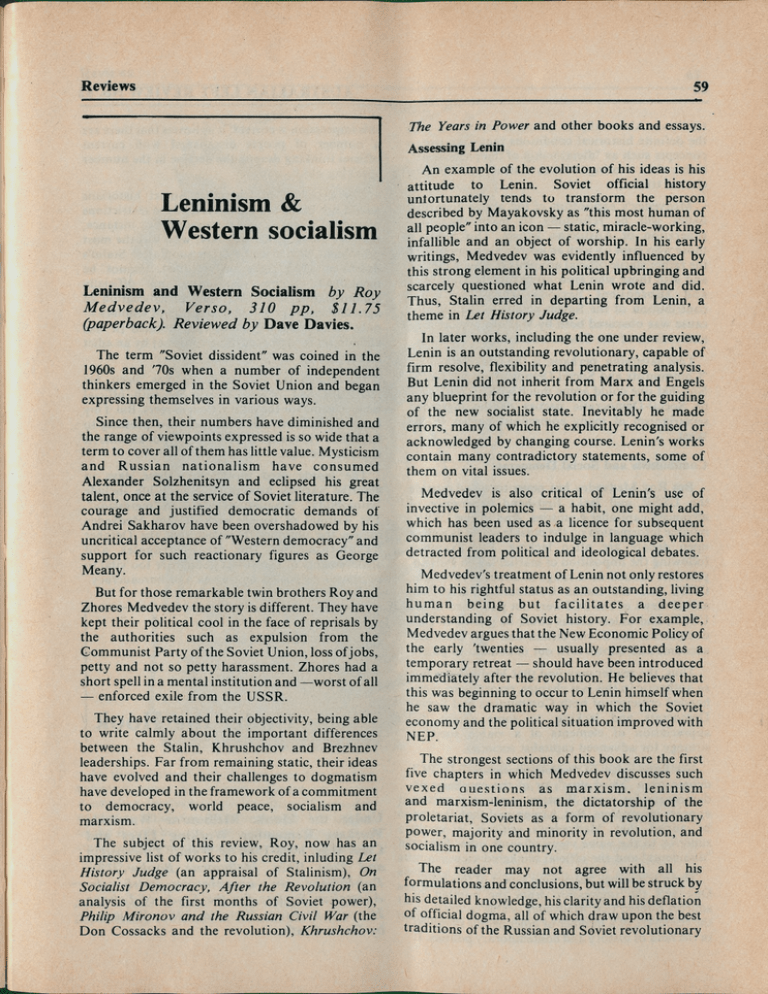
Reviews 59 The Years in Power and other books and essays. Assessing Lenin Leninism & Western socialism Leninism an d W estern Socialism by Roy M edvedev, Verso, 310 p p , $11.75 (paperback). Reviewed by D ave D avies. The term "Soviet dissident" was coined in the 1960s and '70s when a number of independent thinkers emerged in the Soviet Union and began expressing themselves in various ways. Since then, their numbers have diminished and the range of viewpoints expressed is so wide that a term to cover all of them has little value. Mysticism and R ussian nationalism have consumed Alexander Solzhenitsyn and eclipsed his great talent, once at the service of Soviet literature. The courage and justified democratic demands of Andrei Sakharov have been overshadowed by his uncritical acceptance of "Western democracy" and support for such reactionary figures as George Meany. But for those remarkable twin brothers Roy and Zhores Medvedev the story is different. They have kept their political cool in the face of reprisals by the authorities such as expulsion from the Communist Party of the Soviet Union, loss of jobs, petty and not so petty harassment. Zhores had a short spell in a mental institution and —worst of all — enforced exile from the USSR. They have retained their objectivity, being able to write calmly about the important differences between the Stalin, Khrushchov and Brezhnev leaderships. Far from remaining static, their ideas have evolved and their challenges to dogmatism have developed in the framework of a commitment to democracy, world peace, socialism and marxism. The subject of this review, Roy, now has an impressive list of works to his credit, inluding Let History Judge (an appraisal of Stalinism), On Socialist Democracy, After the Revolution (an analysis of the first months of Soviet power), Philip Mironov and the Russian Civil War (the Don Cossacks and the revolution), Khrushchov: An example of the evolution of his ideas is his attitude to Lenin. Soviet official history untortunately tends to transform the person described by Mayakovsky as "this most human of all people" into an icon — static, miracle-working, infallible and an object of worship. In his early writings, Medvedev was evidently influenced by this strong element in his political upbringing and scarcely questioned what Lenin wrote and did. Thus, Stalin erred in departing from Lenin, a theme in Let History Judge. In later works, including the one under review, Lenin is an outstanding revolutionary, capable of firm resolve, flexibility and penetrating analysis. But Lenin did not inherit from Marx and Engels any blueprint for the revolution or for the guiding of the new socialist state. Inevitably he made errors, many of which he explicitly recognised or acknowledged by changing course. Lenin's works contain many contradictory statements, some of them on vital issues. Medvedev is also critical of Lenin's use of invective in polemics — a habit, one might add, which has been used as a licence for subsequent communist leaders to indulge in language which detracted from political and ideological debates. Medvedev's treatment of Lenin not only restores him to his rightful status as an outstanding, living hum an being but fa c ilita te s a deeper understanding of Soviet history. For example, Medvedev argues that the New Economic Policy of the early 'twenties — usually presented as a temporary retreat — should have been introduced immediately after the revolution. He believes that this was beginning to occur to Lenin himself when he saw the dramatic way in which the Soviet economy and the political situation improved with NEP. The strongest sections of this book are the first five chapters in which Medvedev discusses such vexed a u estio n s as m arx ism , leninism and marxism-leninism, the dictatorship of the proletariat, Soviets as a form of revolutionary power, majority and minority in revolution, and socialism in one country. The reader may not agree with all his formulations and conclusions, but will be struck by his detailed knowledge, his clarity and his deflation of official dogma, all of which draw upon the best traditions of the Russian and Soviet revolutionary 60 tradition. Above all, the author is concerned with the definite historical conditions that gave rise to concepts such as "dictatorship of the proletariat", rather than treating them as abstract principles or eternal truths. Medvedev's exposition of the above historical issues will be refreshing to more than one generation of Australian leftists. This includes those who grew up with an uncritical acceptance of the rather sterile official accounts of Soviet history and also those who grew up during the Cold War and subsequent periods when the great contribution of the Soviet people to the socialist cause was obscured both by Western propaganda and actions of the Soviet leadership. Less satisfying, perhaps, is the final chapter on "Communists and Social Democrats in the West". Not that one could argue much with his criticisms of Social-Democratic parties or the ingrained sectarianism of many communist parties in the West. Communists and Social Democrats But Roy Medvedev has never travelled outside the USSR and lacks first-hand experience of advanced capitalist countries. And in the USSR, reliable information on the outside world as well as open debate are often lacking. For example, following the imposition of martial law in Poland, polemics ensued on a range of issues between the CPSU and the Italian Communist Party. The actual views of the PCI were not published in the USSR, and unless access could be gained to PCI documents, the Soviet citizen had only distorted accounts and quotes torn out of context to go on. Thus, the reader may find that Medvedev is not so authentic in this last chapter, resorting to evenhanded criticism of both Communists and Social Democrats and lacking, to some extent, an appreciation of elements of a viable socialist strategy for advanced capitalist societies. His knowledge of "eurocommunism", of PCI debate on a "third way", or of the emphasis on democracy for many Western communist parties appears incomplete. But, having said that, it must be added that Medvedev's critique is vastly superior to the naive views of some other Soviet "dissidents" and the official blinkered view. There is another heartening aspect of this book. One gets the impression from the number of sources quoted that Medvedev is able to draw on the resources of a number of other people involved in the field of history and contemporary politics. If A U ST R A L IA N LEFT REVIEW N o. 82 this impression is correct, it indicates that there are a number of people dissatisfied with current official thinking despite the decline in the number speaking out. The existence of frustrated Soviet historians would not be surprising in view of the restrictions placed on research and discussion. For instance, the very name of Khrushchov, who was the most prominent Soviet leader from soon after Stalin's death in 1953 right up to 1964, cannot be mentioned. Some years ago, an officially commissioned history of the collectivisation of agriculture was prepared by a group of scholars — only to be scrapped at the last moment (it was already set in type according to some) by an edict from above. Unfortunately, the tendency has been for historians and others to comply with official req uirements for the sake of their careers. But if my hunch is correct, and some are now pressing to have their views expressed in one way or another, it is a positive sign. The words used most often these days to describe various aspects of Soviet life include "immobility", "stagnation" and even "regression". The writings of people such as Roy Medvedev induce the optimist to reflect that the October R evolution and the great struggles and achievements of the Soviet people are too vital to be always encrusted by dogma and bureaucracy. Under the Hook Under the Hook: Melbourne Waterside Workers Remember Working Lives and Class War, 1900-1980 by Wendy Lowenstein and Tom Hills, Melbourne Bookworkers Publishers, in association with the Australian Society fo r the Study o f Labour History, Prahran, Victoria, 1982. Reviewed by Drew Cottle.
